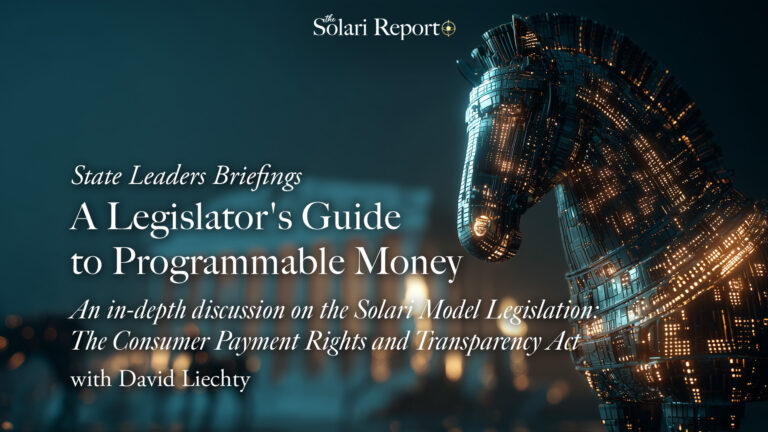“The very word ‘secrecy’ is repugnant in a free and open society; and we are as a people inherently and historically opposed to secret societies, to secret oaths, and to secret proceedings.” ~ John F. Kennedy
By Catherine Austin Fitts
Amy Benjamin’s landmark analysis “The Many Faces of Secrecy” was published in the William & Mary Policy Review in October 2017. It addresses the “systemic secrecy crisis” in the United States. Benjamin is a lecturer at the Auckland University of Technology and is a former attorney at the US Department of Justice.
Her published abstract describes her analysis as follows:
“Political secrecy in the United States has never been more studied – and less understood – than it is today. This irony is due in large part to the slippery nature of the phenomenon: Secrecy presents in different guises depending on the area of governmental activity under consideration. In the classified world of the U.S. national security state, secrecy results from affirmative governmental acts designed to enforce a sharp distinction between official and public knowledge. In the outsourced and technocratic worlds of governmental contracting and economic management, secrecy results from quiet acts of exemption of whole areas of decision-making from the normal processes of public scrutiny. Scholars have underestimated the magnitude of the political secrecy that besets American society, and misconceived prescriptions meant to manage it, because they have failed to recognize that they are dealing with the same challenge in different form across multiple disciplines.
This Article attempts to effect, for the very first time, the kind of comparing-of-notes that is needed for a proper assessment of the scope of political secrecy. It introduces a simple yet indispensable typology – direct versus indirect secrecy – that enables us to recognize the many different faces of secrecy. Once we do so we are in a position to realize that we are confronting a systemic secrecy crisis. For various reasons and under cover of conflicting rationales, large swaths of policy-making have been placed beyond the review-and-reaction authority of the American people, to the detriment of even the most humble conceptions of transparency and democracy.”
~Benjamin, Amy, The Many Faces of Secrecy (September 18, 2017). William & Mary Policy Review, Vol. 8.2 (2017) . Available at SSRN.
While I was in Auckland, I had the opportunity to interview Amy for the Solari Report. We discussed her concepts of direct and indirect secrecy and explored in detail how indirect secrecy is engineered so as to make it difficult, if not impossible, for the general population to understand what is happening around us — in the government, in the economy and the financial markets.
Indirect secrecy includes (i) monetary and fiscal policy (making sure you do not have accessible central bank and government financial disclosure so you can understand “how the money works”), (ii) outsourcing government operations and intelligence to private corporations and (iii) engineering secret agreements and transactions through international institutions.
It is a challenge to understand how so much is kept secret. Once you understand the mechanics and infrastructure, however, that engineers this growing divide between “official reality” and reality, the world we are living in today starts to make a lot more sense.
We explore how to return transparency to our governments and public discourse.
We will publish this fascinating discussion for you this coming Thursday.
In next week’s Let’s Go to the Movies I will comment on Bill Arkin’s excellent database development for the series he co-authored Top Secret America described here in his 2011 interview on Democracy Now.
Unfortunately, this searchable data has recently been taken off line.
It is the last week of the month so there is no Money & Markets. I will be flying from New Zealand to San Francisco. If you are in the Bay Area I hope to see you for our tea on the afternoon of June 2. Subscribers can sign up here.
Related Reading:
Blank Spots on the Map: The Dark Geography of the Pentagon’s Secret World by Trevor Paglen





















































































































Hopefully reps would hold tight reign on their oversight of money and processes if only out of fear of facing their constituents on a daily basis. Greater accountability, more transparency and less special interest access….
🙂
Hopefully reps would hold tight reign on their oversight of money and processes if only out of fear of facing their constituents on a daily basis. Greater accountability, more transparency and less special interest access….
🙂
Thanks Andrew for the highlights have listened to it twice. Love it, and will use your highlights. Also thanks for the letter.
Thanks Andrew for the highlights have listened to it twice. Love it, and will use your highlights. Also thanks for the letter.
There is a lot of meat in the discussion. Humor was mentioned a couple times, so let me throw in that AI does a lot of things, but humor isn’t one of them. You can easily spot-a-bot if you will, by frame-twisting, especially in vernacular that is regional or archaic. Certainly computers can retail jokes and riddles, but they actually have no sense of humor, because to them nothing is funny, sad, tragic or satisfying. It’s just all calculations.
One could say it takes a soul to feel and as I often assert, machines don’t have them. I do believe AI machines have the ultimate intention of capturing souls, and it is for this reason one must maintain his integrity. The deal with the devil is the one where you make out materially while selling the only thing that is valuable. That was also highlighted in the discussion. It’s something I observed even while I was in my salad days of working. Those who seem to have a disproportionate lot probably stole it–whether “legally” or not. But then, the system, itself a virtual machine, has captured your soul.
Catherine mentioned the Truth and Reconciliation concept previously, and I’ve thought about it a bit and agree it’s the right thing to do. I don’t care for the idea of in effect, forgiving debt, as it appears to reward those who accrued it while ignoring those who trod the straight-and-narrow. But let’s face it, the only way we will find truth is to grant immunity. Otherwise, we all die in an illusion, which is a punishment of great negative value that could be avoided.
Musk is correct that AI can be directed by demonic/interdimensional forces. I think AI is a major contributor to what is going so wrong in America. Australia is happy. NZ is relatively happy. Europe is happy when I am there despite the tensions. The mood in the US feels like terror trying to pretend things are ok.
There is a lot of meat in the discussion. Humor was mentioned a couple times, so let me throw in that AI does a lot of things, but humor isn’t one of them. You can easily spot-a-bot if you will, by frame-twisting, especially in vernacular that is regional or archaic. Certainly computers can retail jokes and riddles, but they actually have no sense of humor, because to them nothing is funny, sad, tragic or satisfying. It’s just all calculations.
One could say it takes a soul to feel and as I often assert, machines don’t have them. I do believe AI machines have the ultimate intention of capturing souls, and it is for this reason one must maintain his integrity. The deal with the devil is the one where you make out materially while selling the only thing that is valuable. That was also highlighted in the discussion. It’s something I observed even while I was in my salad days of working. Those who seem to have a disproportionate lot probably stole it–whether “legally” or not. But then, the system, itself a virtual machine, has captured your soul.
Catherine mentioned the Truth and Reconciliation concept previously, and I’ve thought about it a bit and agree it’s the right thing to do. I don’t care for the idea of in effect, forgiving debt, as it appears to reward those who accrued it while ignoring those who trod the straight-and-narrow. But let’s face it, the only way we will find truth is to grant immunity. Otherwise, we all die in an illusion, which is a punishment of great negative value that could be avoided.
Musk is correct that AI can be directed by demonic/interdimensional forces. I think AI is a major contributor to what is going so wrong in America. Australia is happy. NZ is relatively happy. Europe is happy when I am there despite the tensions. The mood in the US feels like terror trying to pretend things are ok.
I guess with AU and NZ, as Benjamin argues, “Ignorance is Bliss.” That’s certainly the world we grew up in. Are we better off now that we’ve seen through the keyhole? Our machines are looking through theirs at us, and contributing to a almost lawless disciplinary system that punishes ‘wrong-think.’ If we zoom the picture out a little, we should realize that our religious training promised JUST SUCH A SYSTEM. Along with Santa’s all-seeing eye, The Lord knew ye before ye knew yourself. Now it is manifestly our “security” services who assume that prerogative. One can certainly see where it could make for a bad mood. The dilemma is, you don’t want to be a target, but you also don’t want to be oblivious.
There are 325 million targeted individuals in America. Behavior can alter the intensity of your individual harvesting. However, you are being managed and harvested and the notion that good behavior offers immunity is one of the greatest scams that keeps the harvesting rolling along profitably.
They got the guns, but
We got the numbers